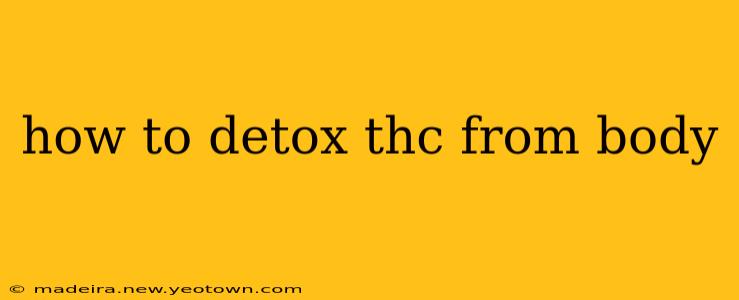How to Detox THC From Your Body: A Comprehensive Guide
The lingering effects of THC, the primary psychoactive compound in cannabis, can be a concern for various reasons. Whether you're facing a drug test, aiming for a healthier lifestyle, or simply want to feel your best, understanding how to effectively detox your body of THC is crucial. This isn't a quick fix, but a process that requires patience and a holistic approach. Let's explore the journey.
It's important to preface this by saying that there's no magic bullet for instant THC detoxification. The speed of elimination depends on factors like your metabolism, frequency of use, body fat percentage, and the potency of the cannabis consumed. However, several strategies can accelerate the natural process.
What are the Common Methods to Detox THC?
This is a question many people ask, and the answer isn't a single method, but rather a combination of strategies working together. We'll explore the most commonly discussed methods, weighing their effectiveness and potential risks.
How Long Does it Take to Detox From THC?
The time it takes to detox from THC varies considerably from person to person. Factors influencing this timeframe include:
- Frequency of Use: Occasional users will generally detox faster than chronic users.
- Potency of Cannabis: Higher potency cannabis stays in the system longer.
- Metabolism: Individual metabolic rates influence how quickly the body processes and eliminates THC.
- Body Fat Percentage: THC is fat-soluble and can store in fat cells, prolonging detection.
While some claim rapid detox methods, these are often ineffective and potentially dangerous. A realistic timeline for detectable THC to leave your system is typically between a few days to several weeks, even months for heavy, chronic users.
What are the Best Ways to Speed Up the Detoxification Process?
There's no single "best" way, but a multi-pronged approach is generally most effective. Here are some key strategies:
-
Hydration: Drinking plenty of water is essential. Water helps flush toxins from your system, aiding in the natural elimination process. Aim for at least eight glasses of water daily, and consider adding electrolytes to replenish what you lose.
-
Healthy Diet: A balanced diet rich in fruits, vegetables, and whole grains is vital. These foods provide essential nutrients that support liver and kidney function, both critical for detoxification. Limit processed foods, sugary drinks, and unhealthy fats.
-
Exercise: Regular physical activity increases metabolism and promotes detoxification. Moderate-intensity exercise like brisk walking, jogging, or cycling can be very beneficial. Remember to stay hydrated during and after exercise.
-
Sauna: While some claim saunas help with THC detoxification, there's limited scientific evidence to support this. However, saunas can promote sweating, potentially aiding in the release of some toxins.
-
Over-the-Counter Detox Products: The effectiveness of these products varies widely. Many are marketed aggressively, but their claims often lack robust scientific backing. Proceed with caution and consult a healthcare professional before using any of these products.
Can I use Detox Drinks or Pills to pass a drug test?
While many detox drinks and pills claim to help you pass a drug test, their effectiveness is questionable at best. These products often contain diuretics that increase urination, which might dilute the THC concentration in urine samples. However, they don't actually remove THC from the body. Their use is a gamble and may not guarantee a negative result.
What are the potential risks associated with rapid THC detox methods?
Attempts at rapid detoxification can be risky and may even be harmful to your health. Some methods can lead to dehydration, electrolyte imbalances, and other adverse effects. It's crucial to prioritize your health and well-being over the desire for rapid results.
Disclaimer: This information is for educational purposes only and is not intended as medical advice. Always consult with a healthcare professional before making any significant changes to your diet or health regimen, especially if you have pre-existing health conditions or are taking medications. They can provide personalized guidance and address any specific concerns you may have.

